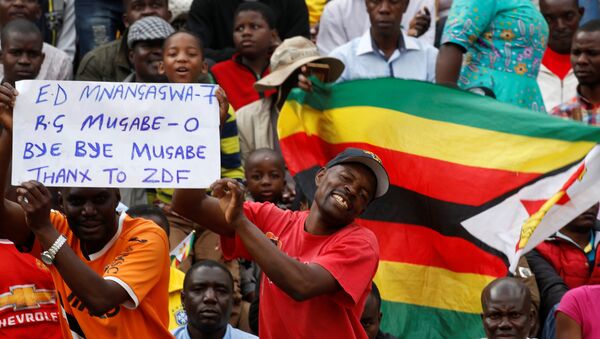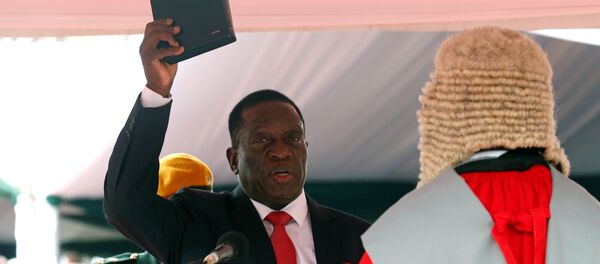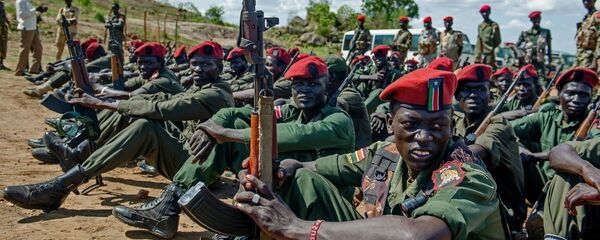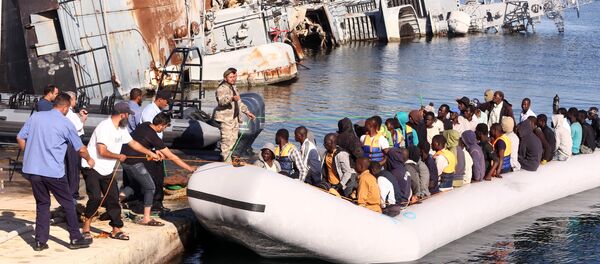Zimbabwe's recent political change and the resignation of former President Robert Mugabe are not a coup under the African Union's rules, Smail Chergui, the bloc's commissioner for peace and security, told Sputnik on Wednesday, adding that the African Union is not planning to impose any sanctions against Zimbabwe in relation to the recent power change.
"It's not a coup according to African Union rules, because we are the one to declare if someone has made a coup and then apply sanctions… We are neither in a crisis in Zimbabwe nor in extraordinary situation," Chergui said.
"We didn't lose a single life in this process, totally peaceful and at the end, even the [former] president left with honor. It was just a dialogue between the leadership of the country and the president and they convinced him that maybe some of the actions taken, including around him and his immediate surrounding, were not good for the country, and he accepted to submit his resignation willingly," the official said.
In late November, Emmerson Mnangagwa, Zimbabwe’s former vice president, was sworn in as president. The inauguration took place after the army deployed its vehicles to the county’s capital Harare and confined Mugabe to his house. The Zimbabwean parliament subsequently approved Mugabe's impeachment, after which the long-time leader stepped down. Mnangagwa, who was a likely successor of the then incumbent president, was dismissed by Mugabe from his position as vice president on November 6 and forced to flee to South Africa.
However, during the political turmoil, there were media reports on armored vehicles deployed to the Zimbabwean capital city of Harare, and the television broadcasting station in the city was seized by the military. The military announced that their actions were not a coup but rather directed against the "criminals."
READ MORE: Standoff in Zimbabwe: 'Mugabe Would Protect Legacy by Stepping Down Voluntarily'
African Union, Russia Agree to Create Joint Working Group on Education
Russia and African Union agreed to establish a working group on education to reinforce technology and science in African countries, Smail Chergui, the African Union's commissioner for peace and security, told Sputnik on Wednesday.
"We will be also establishing joint working group on education. [The group is] mainly [about] how we can reinforce the cooperation in mathematics, in scientific and technology fields for the continent," Chergui said.
Chergui called the negotiations with Russian colleagues "fruitful."
Earlier in the day, the diplomat held a meeting with Russian Foreign Minister Sergei Lavrov in Moscow, where the parties discussed existing joint projects, including the working group to tackle drug problems, and the new initiative of creating a similar joint task force on education.
Aditionally, Russian Foreign Minister is expected to pay a visit to Addis Ababa, Ethiopia, where African Union (AU) headquarters are located, in early 2018 for furthering dialogue with the African bloc, Chergui added.
"Lavrov is also coming on official visit to Addis [Ababa]. So it's [the talks in Moscow] a kind of preparation for the visit… It [Lavrov’s visit] is a continuation of dialogue and cooperation," Chergui said, adding that the visit was expected to take place in early 2018.
Russia and the African Union agreed to create a task force to address drug problems during AU Commission Chairwoman Nkosazana Dlamini Zuma's visit to Moscow in April 2016. The African Union, launched in 2002, unites the states on the African continent. It was created to replace the Organisation of African Unity (OAU). The union's activities are mainly devoted to the issues of tackling poverty and other socio-economic and political problems of the African states. Both Russia and the African Union have repeatedly expressed willingness for enhanced cooperation
READ MORE: South Africa: New ANC President Could End Up Being a 'Lame Duck' — Professor
UN Must Boost Work With African Union on Resolution of Libyan Crisis
The crisis in Libya cannot be resolved if the United Nations fails to actively involve the African Union in mediation efforts, and the organization is fully prepared to assist in solving this problem, Chergui told Sputnik.
"We want African Union to be heard, and allow it to play its role, we have a high level panel of heads of states, chaired by the president of Congo, there are efforts underway, so we want to be fully engaged and fully participating in the solution [for Libya]… unless the UN is working closely with us, the African Union… the crisis will unfortunately continue," Chergui said.
The commissioner added that he would like to remind the nations involved in the crisis that Libya's current situation was "the result of unfortunate military intervention in Libya."
According to the diplomat, a "holistic approach" was needed to tackle the crisis and it had to include economic projects and investment in Libya and arrangements for legal migration to the EU nations.
"First, it implies maybe some elements of security… economic projects, investment in this country… And in this holistic approach, we want also that legal migration is included. So they [EU states] can not close the door totally," Chergui explained.
Libya has been destabilized and fragmented into territories controlled by rival political forces since its longtime ruler Muammar Gaddafi was overthrown in 2011. In recent years, the country has become a gateway to Europe for numerous migrants from other African states, but Libya has had difficulty managing the influx of migrants.
READ MORE: Libyan Deputy PM Stresses Russia's Active Role in Libya's Settlement







